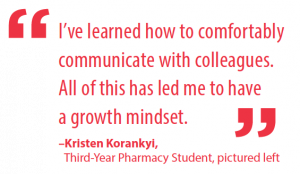This story is featured in the Fall 2019 edition of the HPU Magazine. Discover below how HPU’s Fred Wilson School of Pharmacy is conducting grant-worthy research.
What do antibiotic resistant bacteria, opioid addiction and jaundice have in common?
These health care challenges are all being researched inside High Point University’s Fred Wilson School of Pharmacy.
Dr. Comfort Boateng is developing a drug molecule to treat opioid and cocaine addicts, and Dr. Aurijit Sarkar is battling antibiotic resistant bacteria.
Working alongside them are students like Kristen Korankyi (pictured above), a third-year pharmacy student, who’s now writing an academic article on her findings.
It Takes a Growth Mindset to Succeed
The foundation for impactful research experiences in the School of Pharmacy begins with faculty who are committed to their students’ success. Sarkar believes having a growth mindset is crucial in science and works to instill that in students.
“I help them understand the degree of work and rigor required to produce high quality data,” says Sarkar. “The constant question we must ask ourselves is, ‘How do we improve our work?’ Then they learn to turn that data into information for presentations or manuscripts. This helps them develop critical and transferrable life skills wherever they go.”
Through encouragement and persistence, Sarkar has seen students transform into scholars.
“Kristen took on the responsibility of conducting background research on how bacteria use sugars to manifest antibiotic resistance,” says Sarkar. “I like maintaining strong communication with professors because it helps me connect to different research opportunities,” says Korankyi. “I’ve learned how to comfortably communicate with colleagues. All of this has led me to develop a growth mindset.”
Globally Impactful Research with a Personal Touch
Savannah Heath, a third-year student, and Sarkar are submitting an article to the European Journal of Pharmaceutical Sciences.
Heath approached Sarkar for research during her first year.
“Dr. Sarkar told me about how his son was born with a mild form of jaundice,” says Heath. “I did a lot of background research and wrote a 32-page review article related to what causes jaundice.”
“The hospital drew close to a milliliter of blood from him every day for routine tests,” says Sarkar. “For a newborn baby, that’s a lot of blood, so I was drawn to the problem.”
Heath was there to help. She found a problem they could work on.
“During jaundice, children have excess bilirubin in their blood, partly because certain gut bacteria break down the excreted form of bilirubin and make it into a more absorbable form, so it goes right back into the blood,” says Sarkar. “We are looking into developing a drug to block the enzyme that is responsible.”
Sarkar’s son overcame the condition quickly, but the project could potentially have a lasting global impact.
“Jaundice occurs in around eight to 11% of all newborns and can lead to brain damage,” says Sarkar. “Our research could potentially help millions of children avoid childhood jaundice. Think of all the lives we would be making better.”
Drug Discovery and Design
On the next floor up from Sarkar’s lab, Boateng is hard at work developing a drug molecule to treat opioid addiction thanks to funding from the American Chemical Society Project SEED.
“Everything that we are doing in our research lab is to treat addictive patients by developing new drug molecules,” says Boateng. Rebekah Placide, a third-year student, and Sonvia Brown-King, a fourth-year student, work with Boateng in the lab. At conferences, they’ve presented their findings regarding the effects of dopamine receptors on cocaine-use disorders, and they’ve both won awards for their work.
“I have an interest in mental health and substance use disorders,” says Placide. “Once I saw that was Dr. Boateng’s background, I had to get involved. At HPU, the classes are small, so having personal experiences with professors has helped me develop public speaking and scientific writing skills.”

